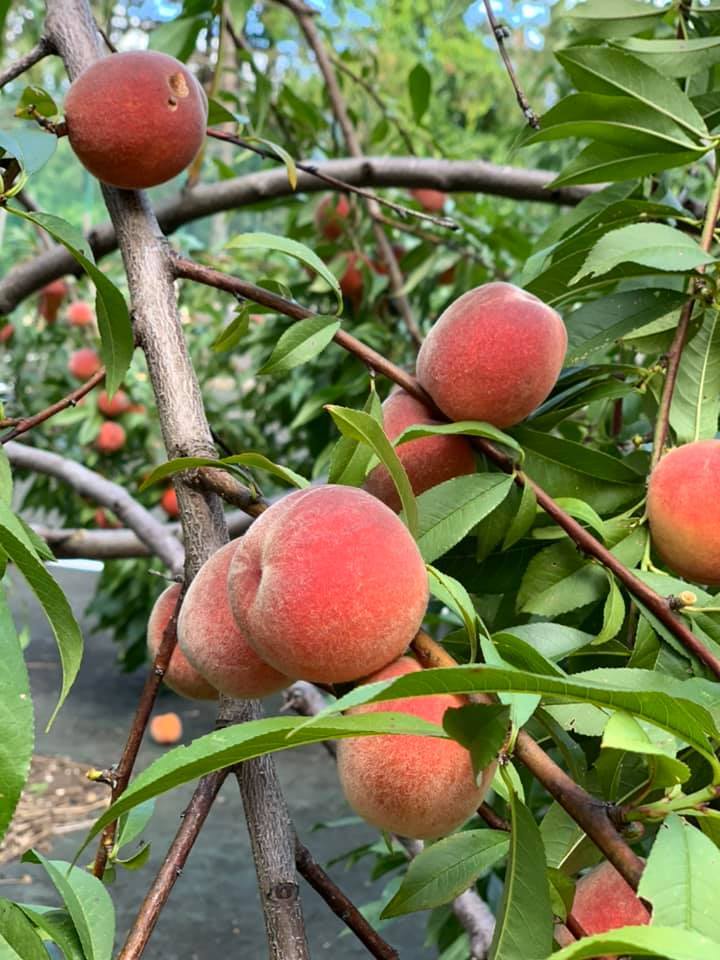
Two sets of images of the earth converged in my mind this week: one of delightful abundance, another of apocalyptic ruin.
At the retreat center, our peach tree grows on an old tennis court transformed into a garden and mini-orchard. It is not a big tree. Yet it yielded over 1100 peaches this season. Its branches bowed down to the ground, threatening to snap under the weight of its own fruit. Its trunk held together with support wires. We delivered 300 peaches to Loaves & Fishes, the Mount Olivet program that serves 1500 meals weekly to those in need. We froze hundreds more for future retreat center guests. Volunteers and staff members carried full buckets home with them.
Last weekend I walked around our peach tree in sheer amazement. My daughter feasted on a peach as she squeezed in between the branches, walking around and under them as if in a maze. My niece baked us a scrumptious peach crisp.
Even more surprising is the fact that last year this same tree yielded a single peach. Just one. None of us could have predicted this year’s abundance, certainly not when remembering last year’s scarcity. Life is like that. It has its own time-table and, in some sense, always remains a mystery. Who knows when a harvest will be abundant or when famine will strike? Who knows how relationships will be mended after decades of estrangement? When will the body recover after a car crash or child-bearing? What love will finally heal a broken heart?


Long before the Byrds sang “Turn Turn Turn,” the writer of Ecclesiastes wrote,
“For everything there is a season, and a time for every matter under heaven:
a time to be born, and a time to die;
a time to plant, and a time to pluck up what is planted;
a time to kill, and a time to heal;
a time to break down, and a time to build up;
a time to weep, and a time to laugh;
a time to mourn, and a time to dance;
a time to throw away stones, and a time to gather stones together;
a time to embrace, and a time to refrain from embracing;
a time to seek, and a time to lose;
a time to keep, and a time to throw away;
a time to tear, and a time to sew;
a time to keep silence, and a time to speak;
a time to love, and a time to hate;
a time for war, and a time for peace.”
We cannot predict the times in which we will live, though we have choice about how to live in them. This will entail no small amount of waiting.
Much of life is waiting. We wait to laugh again after immense grief. We wait to speak (hopefully) after long stretches of listening. We wait for vaccines to be developed. We wait for spring flowers to push through frosty ground. We wait for new life to emerge out of nothing. We wait for resurrection after death. Which is to say we wait for God to do that which we cannot.

The orange-red skies over San Francisco, billows of smoke encasing parts of Oregon, ash raining down from the heavens, homes and communities levelled, fires raging in twelve states: though farther away, these images are as real as the vibrant peach tree. One set elicits awe and celebration; the other elicits shock, heartbreak, and fear. “Apocalyptic” is the apt word repeatedly used to depict these scenes.
Part of the earth is in anguish, and so are its inhabitants. We belong to them and the earth. May prayers of lament and petition flow from our lips: for firefighters in harm’s way, for those displaced, for those whose loved ones have died, for clean air to breathe, for rain to pour down and fires to cease, for forests to be spared, and more.
As I hold these two sets of images in my mind, it’s easier for me to focus on the scorched earth and devastation. It’s tempting (for many of us) to allow the ruin to overrun our minds so that the abundance is forgotten or at least relegated to the margins of our imagination. As psychologist and meditation teacher Jack Kornfield puts it, “Your brain is wired with a negative bias . . . you need to train yourself to turn toward moments of well-being and joy, to invite, foster, and then learn to dwell in them.”
And so, may prayers of thanksgiving and awe flow from our lips as well: for abundant fruits and vegetables, for blue birds and monarch butterflies, for persons caring for one another in ordinary ways, for small kindnesses, and for the gift of life that emerges, again and again, in its own time in our lives, in our earth.
*Theresa F. Latini, Ph.D. is the Executive Director of Mount Olivet Conference & Retreat Center and an ordained minister in the Presbyterian Church (USA)